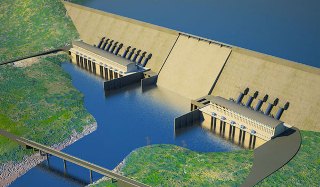Ethiopia’s Nile dam to start power generation soon
By Tesfa-Alem Tekle
April 4, 2015 (ADDIS ABABA) – The construction of the over four billion dollar Hydro power plant known as Ethiopia’s Grand Renaissance Dam being built along Nile river is in full swing, an official said.

The Nile dam project covers an area of 1,800 sq km totally turning Guba and other localities at the region in to a huge power plant construction site.
Some 400 of the 8,500 workers are expatriates from 25 different countries. they are currently actively engaged in non-stop 24 hours activity at the site despite the scorching heat difficulties where the temperature could reach as high as 49 degree Centigrade.
Project manager engineer, Simegnew Bekele, told visiting journalists that 42% of the dam project has been completed.
Bekele said the project is well in progress in all aspects.
He was confident that the project will be achieved as scheduled in 2017.
“We are aggressively proceeding towards achieving different milestones of the project,” he said adding “This is not only to start generating electricity but also to achieve the earlier generation scheme and finalise construction of the dam in time”
During the visit, Sudan Tribune has witnessed completion of the excavation, concreting and other major earth works of the site.
A total of 17 million cubic meters of materials had been removed so far in an excavation activity followed by placing 2.8 million cubic meters of roller compacted concrete.
Following the earth works, installation of Hydro mechanical and Hydraulics related structures that enable to generate electricity are launched.
WATER FILLING
As earth works comes to completion. Engineer Simegnew said water filling activities to the reservoir will be started soon
One of the contentious issues Ethiopia had with Egypt was on the strategy to fill the dam reservoir that holds 67 billion cubic meters of water, which is more than twice of what Ethiopia’s largest lake, Tana, could hold at its peak.
Cairo has strictly opposed a water filling strategy that won’t guarantee its water security.
The desert North African nation argued that any type of fast water filling would totally put in danger over 85% of its people who rely on the water resources of the world’s longest river.
However, the chief engineer of the project, Bekele said Ethiopia will follow a “a progressive water filling strategy”.
“We have already incorporated the structures of the dam in a way to release water per requirements by downstream countries” he told reporters.
He said the reservoir will be filled progressively in about 6 years of time per agreements reached previously.
TEST TRIALS
The 6000 MW hydro-electric power plant will have 16 unites along two power houses with each unit having a power generation capacity of 375 MW.
Two unites will start generating electricity soon as the first stage of water filling activity is completed, Bekelle told Sudan Tribune.
According, one unite will begin to generate an initial 108 MW in about two months in a test trial which will slowly rise to 375 MW.
BENEFITS TO SUDAN AND EGYPT
Egypt has in the past warned against any developmental projects along the Nile River by upper stream Ethiopia which is a source to over 85% of the River.
Egypt fears the construction of what would be Africa’s biggest dam would eventually diminish its water share.
However in its final report, an international panel of experts tasked to study the impact of the dam project revealed that the power plant won’t have any significant harm on lower riparian countries, Sudan and Egypt.
Addis Ababa says the dam project never meant to hurt downstream countries, instead will benefit them.
Engineer Bekelle says the dam project will also serve as flood prevention structure.
“The regulated flow of the water will protect Khartoum from over flooding during wet season” He said
It will also trap sediments which would be accumulated in the two lower riparian countries.
He added the regulated flow of the water will enable Egypt and Sudan to generate more energy without building Hydro power dam.
“The continuous and regulated flow of water to their turbine will enable them to easily produce energy because there won’t be over flooding that will flow over their spillway” he said.
“Above all there will be a green energy that will be harnessed from the plant” he said adding “that is why we call the dam project also is other nation’s project being built in Ethiopia by Ethiopian’s”
Ethiopia launched the massive Hydro power dam project in 2011. The horn of Africa’s nation is building the dam project from own coffers mainly by mobilizing public funds and selling bonds.
The Ethiopian Grand renaissance dam is the world’s first Hydro power dam project being built by peoples of a nation.
(ST)
